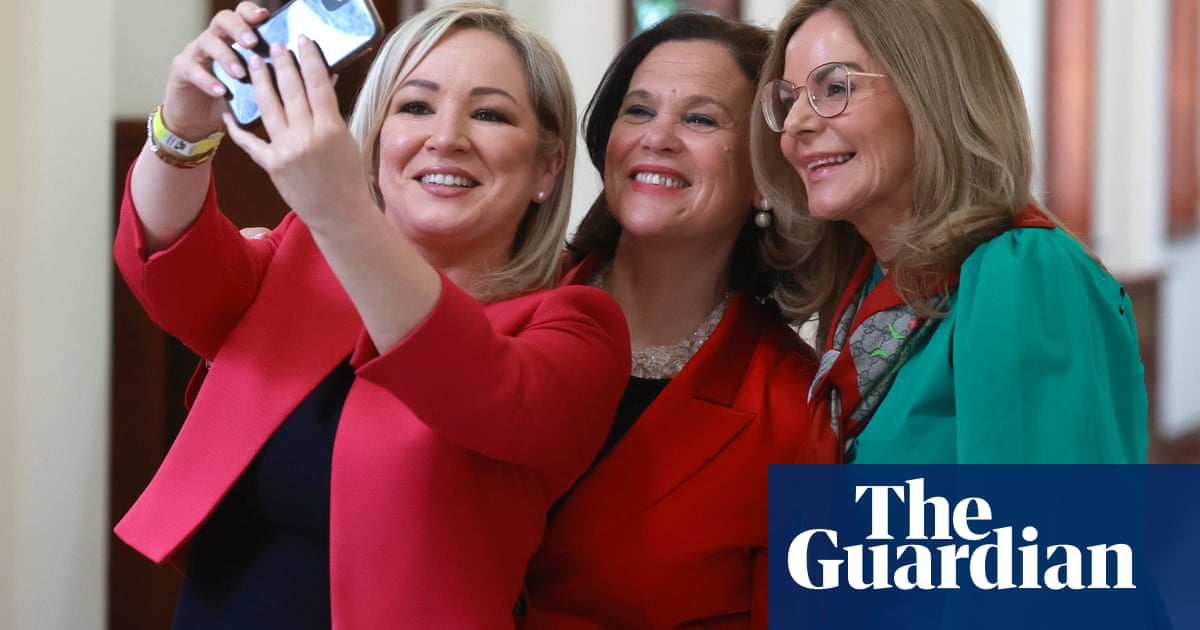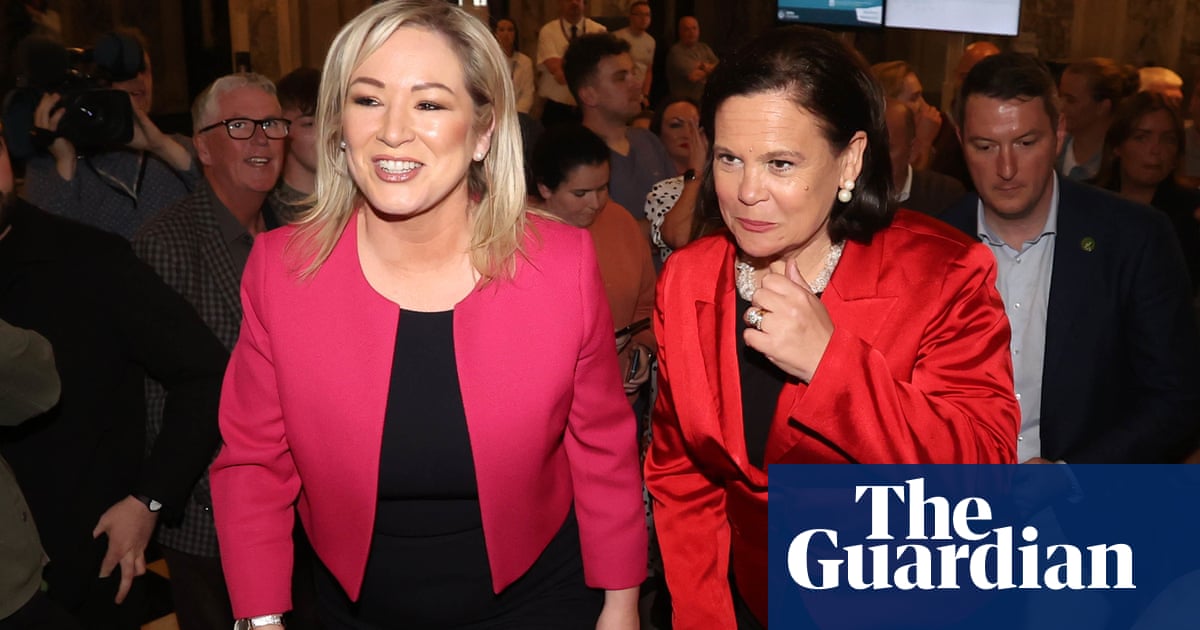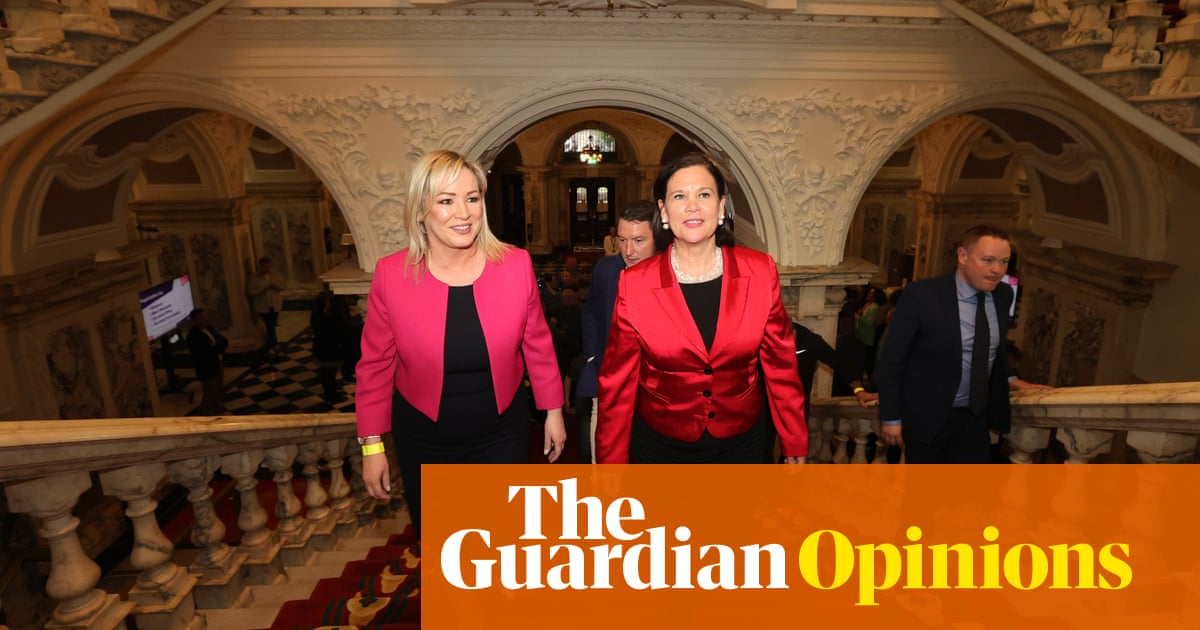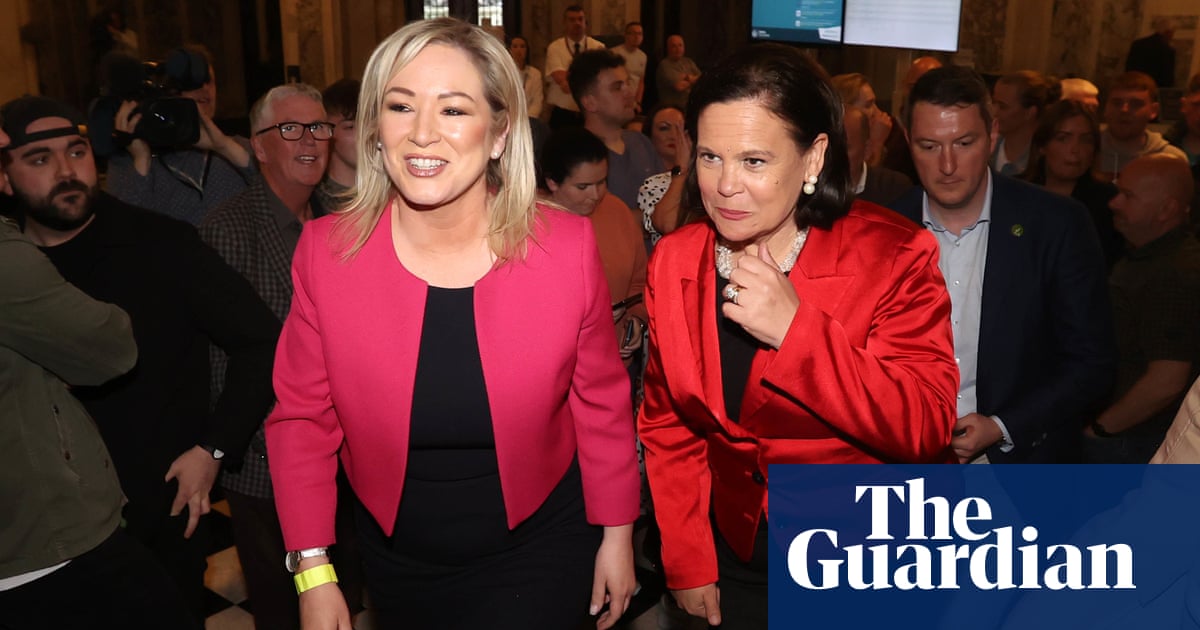
Sinn Féin to become largest party in Northern Ireland assembly
Sinn Féin is to become the largest party in the Northern Ireland assembly for the first time.
It reached 27 seats in the election, pushing the DUP into second place.
Michelle O’Neill is now set to become the country’s first nationalist first minister.
A summary of today"s developments
Sinn Féin is to become the largest party in the Northern Ireland assembly for the first time. It reached 27 seats in the election, pushing the DUP into second place. Michelle O’Neill is now set to become the country’s first nationalist first minister. Northern Ireland secretary Brandon Lewis said: “I encourage the parties to form an executive as soon as possible.”
Sir Keir Starmer said he is “confident” that he did not breach lockdown rules by having a beer and curry at a campaign event. The Labour leader spoke after Durham constabulary confirmed it was investigating claims an evening event attended by the Labour leader with other senior party figures and activists last year might have broken social distancing regulations.
Boris Johnson will use the Queen’s Speech as an effort to secure his leadership following a bruising set of local elections which saw the Tories lose control of key authorities and suffer a net loss of more than 400 councillors. The speech on Tuesday, setting out the Government’s priorities, would focus on the economy, health and national security, Cabinet minister Nadhim Zahawi said as he urged Tory MPs to rally around the Prime Minister.
The Aspire party has taken control of Tower Hamlets in East London from Labour. On Friday, Aspire’s Lutfur Rahman defeated Labour incumbent John Biggs to become the elected mayor of Tower Hamlets.
Scottish Conservatives leader Douglas Ross has no plans to quit as leader despite losing 60 councillors in the local elections. The day after his party dropped to third place in Scotland, he said he would “try to do better” and continue fighting against the SNP.
Ireland’s taoiseach, Micheál Martin, said it was “incumbent on all political parties” to form an executive in Northern Ireland.
Reacting to the results of the Northern Ireland assembly election, he said: “I would like to congratulate all of the successful candidates on their election.
“It is now incumbent on all political parties and elected representatives to deliver on their mandate, through the nomination of a first and deputy first minister and the formation of a new executive to serve the interests of all of the people of Northern Ireland.
Power-sharing and principles of partnership, equality and mutual respect are at the heart of the Good Friday Agreement, through which peace has been secured and progress achieved for almost 25 years.
“A new power-sharing executive is vital for progress and prosperity for all in Northern Ireland.
“As a co-guarantor of the Good Friday agreement, the government will continue to work in partnership with the British government and engage with the leaders of the political parties in Northern Ireland to seek and support the effective operation of all of the political institutions of the agreement.”
On Friday morning, as broadcasters, pollsters and political analysts tried to make sense of a mixed bag of early results from the previous day’s local elections, no one was quite clear who had performed the best.
All the party leaders seemed happy enough and the political messages were blurred.
Boris Johnson was said by people in Downing Street to be in a buoyant mood when he sat down at his desk at 8.15am, believing the heat was off him.
He had told a meeting with his advisers the previous day that “we are going to get our arses kicked”.
But while he could see his party had indeed taken a beating and was losing seats, it seemed that a Tory meltdown had been avoided, and that Labour was failing to win back support behind the red wall.
While West Tyrone was on the surface another safe victory for Sinn Féin, in reality it was the SDLP that might have savoured the success most.
After a bad few days for the nationalist party, SDLP supporters in the Magherafelt count centre were heartened by the victory of Daniel McCrossan, PA reports.
One of the party’s best-known faces in Stormont, McCrossan was returned with 11.9% of the first preference vote on the sixth count, alongside the DUP’s Tom Buchanan.
McCrossan offered his full support to party leader Colum Eastwood and defended the way the party ran its campaign.
“I think Colum Eastwood has led this election very, very strongly. I think the campaign has been energetic, we have had fantastic candidates.
“I’m talking about politics here in the north of Ireland.
“At this election, everyone on the doors told me they wanted change, the reality is the exact same mandate, only in slightly greater numbers, has been given to the DUP and Sinn Féin. Is that an election for change?”
Shortly after 7pm on Saturday, 88 of 90 Assembly seats had been filled.
Sinn Féin currently has 27 seats while the DUP has 24, the Alliance Party 17, the Ulster Unionists (UUP) nine and the SDLP on seven, with four others.
Boris Johnson will use the Queen’s Speech as an effort to secure his leadership following a bruising set of local elections which saw the Tories lose control of key authorities and suffer a net loss of more than 400 councillors.
The speech on Tuesday, setting out the Government’s priorities, would focus on the economy, health and national security, Cabinet minister Nadhim Zahawi said as he urged Tory MPs to rally around the Prime Minister.
The Prime Minister’s troubles deepened on Saturday, with a constitutional headache in the form of Sinn Fein’s victory in the Stormont elections, PA reports.
Northern Ireland Secretary Brandon Lewis said: “I encourage the parties to form an executive as soon as possible.
“The people of Northern Ireland deserve a stable and accountable local government that delivers on the issues that matter most to them.
“The electorate delivered a number of messages on Thursday. They were clear that they want a fully functioning devolved government in Northern Ireland, they want the issues around the protocol addressed, and that they want politics to work better.
“Over the coming days I will be meeting with all the party leaders and will urge them to restore the Stormont institutions at the earliest possible moment, starting with the nomination of an Assembly Speaker within eight days.
“The government remains committed to the Belfast (Good Friday) Agreement and will continue to work with the Northern Ireland parties and the Irish Government to deliver its vision for reconciliation, equality, respect for rights and parity of esteem.
“Together, we must move forward towards a brighter future - that means delivering for all the people of Northern Ireland.”
As Sinn Féin became the largest party in Stormont for the first time, shadow Northern Ireland secretary Peter Kyle said his party could act as an “honest broker”.
He said: “Congratulations to all the new assembly members and to Sinn Féin for earning the right to nominate a new first minister, it is healthy for Northern Ireland that parties from either community can nominate a first minister and shows the Belfast/Good Friday Agreement working. “Unionism will still have a strong voice within powersharing and calls for progress on the remaining issues of the protocol have been heard and should not prevent a return to the executive.
The government must now prioritise practical solutions through negotiation with the EU and not chase headlines with empty threats.
“The Labour party will always be an honest broker for Northern Ireland, and we stand ready to help Stormont deliver on the promise of these elections and get an executive up and running to help people with the cost-of-living crisis we are facing across the United Kingdom.”
Scotland’s first minister Nicola Sturgeon has tweeted:
Activists accused Priti Patel of “racist” and “inhumane” policies over government plans to send migrants to Rwanda during her appearance at a Conservative party dinner.
The home secretary was speaking at the Bassetlaw Conservatives Spring Dinner in Nottinghamshire on Friday when several activists stood up on their chairs and began denouncing Patel for the policy.
Footage published on Twitter by campaigning group Green New Deal shows a woman stand up and tell Ms Patel: “Priti Patel, your racist policies are killing people.
“Your plans to send people seeking asylum to Rwanda are inhumane, they’re inhumane and are going to ruin people’s lives.” A Home Office spokesperson said: “The world-leading migration partnership will overhaul our broken asylum system, which is currently costing the UK taxpayer £1.5bn a year – the highest amount in two decades. “It means those arriving dangerously, illegally or unnecessarily can be relocated to have their asylum claims considered and, if recognised as refugees, build their lives there. “Our new migration and economic development partnership with Rwanda fully complies with international and national law.”
Outgoing Stormont infrastructure minister Nichola Mallon has lost her seat in North Belfast amid an Alliance surge.
The SDLP deputy leader stayed in the race until the final stage of the count on Saturday evening, when former lord mayor Nuala McAllister (Alliance) became the fifth and final MLA elected in the constituency.
Sinn Féin’s Gerry Kelly and Caral Ni Chuilin were both elected on the first count on Friday.
The Aspire party has taken control of Tower Hamlets in London from Labour after winning 24 of the 45 seats on the council, with two seats still to be declared.
On Friday, Aspire’s Lutfur Rahman defeated Labour incumbent John Biggs to become the elected mayor of Tower Hamlets.
Shortly after 6pm on Saturday, 81 of 90 Assembly seats in Northern Ireland had been filled.
Sinn Féin currently has 23 seats while the DUP have 23, the Alliance Party 17, the Ulster Unionists (UUP) nine and the SDLP on six, with three others.
Foreign Office minister James Cleverly accused Keir Starmer of “hypocrisy and dishonesty” over the “beergate” row.
A leaked memo published by the Mail on Sunday indicated the curry enjoyed by Starmer and colleagues in April 2021 while coronavirus restrictions were in force was planned in advance on the schedule for the day’s campaigning, and that no further work was listed after the dinner.
Cleverly said: “Starmer claimed it was an impromptu curry. Turns out it was pre-planned.
“Starmer claimed nowhere served food. Turns out that loads of places did.
“(Angela) Rayner claimed she wasn’t there. Turns out she was. Hypocrisy and dishonesty in equal measure.”
Here is some interesting election analysis on the Northern Ireland results from PA.
While the opinion polls have been predicting it for many months, the achievement appeared to be no less seismic when the results finally began to trickle through.
Sinn Fein has swept aside many years of history and is on course to become the first nationalist or republican party to take the largest share of seats in a Northern Ireland Assembly election.
The results will be a significant psychological blow to Sir Jeffrey Donaldson’s DUP, which has lost its position as the biggest party for the first time since 2003, when it usurped David Trimble’s Ulster Unionists.
Safe in the knowledge that the election was in its hands, Sinn Fein ran a safety-first campaign, seemingly unwilling to engage in any electoral trench warfare, preferring instead to portray vice-president Michelle O’Neill as the “first minister for all” in waiting.
The party also made a tactical decision not to labour the point over its desire to see Irish unity, concentrating instead on bread and butter issues such as the cost-of-living crisis and spiralling hospital waiting lists, which seem to have chimed positively with voters.
The DUP’s gamble on focusing its campaigning energy on unionist opposition to the Northern Ireland Protocol and raising the spectre of a Sinn Fein victory increasing the possibility of a border poll on unity was less successful, with the party dropping both in its share of first preference votes and overall seats.
The much anticipated Alliance Party surge has also become a reality in this election, with the cross-community party now set to become the third largest at Stormont.
The growing support for Naomi Long’s party seems to show an increasing percentage of the population in Northern Ireland want to move away from traditional orange and green politics.
The election has been a crushing disappointment for the smaller unionist and nationalist parties, the UUP and SDLP. Despite their leaders receiving positive personal ratings, any increase in support at the ballot boxes failed to materialise.
UUP leader Doug Beattie, who was spared the indignity of losing his Upper Bann seat, chose to contrast his approach to that of the DUP, insisting that he stood for positive politics, while Colum Eastwood of the SDLP won plaudits in the televised election debates for his articulate portrayals of the concerns facing voters.
However, both parties leave the election facing the headache that they are further away than ever from challenging the hegemony of the larger unionist and nationalist parties.
While the election is now settled, what is less clear is what it will all mean.
Alliance leader Naomi Long topped the poll in Belfast East, where the same party strengths were returned to the Stormont benches.
Long, whose party enjoyed a significant surge across Northern Ireland in the Assembly elections, described a “rollercoaster of a week”.
She dedicated her win in memory of her late father-in-law, who died recently.
Long was elected on the first stage of the count along with DUP candidate Joanne Bunting.
Her Alliance running mate Peter McReynolds was also elected to retain the party’s two Assembly seats in the constituency.
Long paid tribute to Chris Lyttle, who stood aside before the election, quipping that it felt like a divorce to no longer be working together.












